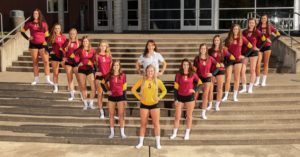Colleges now look for “well rounded students” – ones with a good grade point average and who participate in extracurricular activities and other activities outside of school. This includes volunteering and work. While not every situation can be covered in this article, here are some quick suggestions that may help both students and parents navigate the modern college application.

College expectations are changing and so is the application process. Colleges have started using programs like the Common App to try and make college applications easier for students. This is achieved by students adding relevant information into one common application online. Your application is then is received by all the schools that you have selected to receive your information. This only includes schools that are a part of the Common App program, however.
There are several parts of the application process that students worry about. “Students worry they are not good enough,” Morgan shares. “I always tell them if it’s meant to be it will work. Where you are supposed to attend school, it will all work out, that will be the best place for you.”
She also makes students aware of other options they have and helps students find the right fit. Although, a four year university may be a good fit for some students, it’s not the best option for all. Some students may benefit from a two year technical school or community college. Morgan says a student finding their interest early on helps create structure for them in the future. Once a student has an idea of what they want to do, their college application process will go more smoothly.

Lauren Hunt, a senior at Capital High School, has applied to eight or nine colleges. She started with preparation. This meant she started by focusing on the SAT. She has taken the SAT and ACT twice as well as taking the PSAT. She feels that testing scores, grades and extracurricular activities are three important factors to consider when applying to schools. She also started to consider what classes she wanted to take. One class in particular she enjoyed at CHS was phycology. As a result, she has looked at colleges with good phycology programs. This has been a factor in deciding where she wants to go to school.
Although, she’s applying to several schools, by being organized and prepared she hasn’t felt overwhelmed. “I really like writing essays, so I’ve done that to relax. Since they’re essays about yourself, there’s no research required. It’s just telling personal stories. Finishing up essays is like a reward since I have so many really stressful classes (at CHS) that talking about myself comes way easier by comparison.”

A key factor is staying organized. Hunt made a google document that had application deadlines, college essay prompts or questions, and her personal essays. It helps her keep track of little things. “There are some that are really picky in word count and you want to make sure your not going to miss a deadline.” She found it simpler having important information in one place.
Top Five Tips for College Application Success
- Start early. Start considering classes you might want to take sophomore and junior year. Colleges will look at your transcript. Start thinking about what clubs or sports you’re interested in and get involved early.
- Take the SAT as soon as possible. This will familiarize you with the test and allow you to retake it multiple times. The more you take the SAT, the more your score improves.
- Get familiar with colleges you’re interested in. Colleges appreciate students who know what they want from their school and why. Know what programs, sports or activities, you are interested in at each college.
- Start seeking scholarships and financial aid before you apply. The application process can get overwhelming, stressful and take a lot of time if you’re applying to multiple schools. Apply for all your scholarships and financial aid first. You then have time to do as many as you would like before you run out of time.
- Only participate in sports, clubs and volunteering that matter to you. Some students choose activities they think colleges would like or look good on applications. However, when students have extracurriculars that don’t reflect their values or interests, they lose personality in their applications. Activities you aren’t passionate about could be difficult to discuss later on.

















































